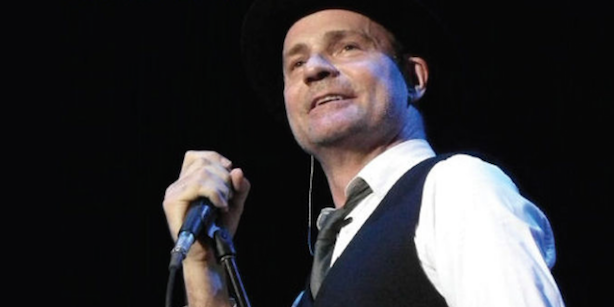 Music
Music
Read an excerpt from the Tragically Hip biography, 'Escape Is At Hand'
by Joshua Kloke
May 24, 2016
At age 10, author Joshua Kloke became a lifelong fan of Gord Downie and The Hip.
Fans of The Tragically Hip responded today with courage and grace, too, at what may be the toughest news they could imagine. In an early morning post, the beloved Canadian band revealed that lead singer and lyricist Gord Downie had been diagnosed with terminal brain cancer.
With the approval of his doctor, the 52-year-old singer and his bandmates of three decades will hit the road for what may be the final time. Their stirring statement said “this feels like the right thing to do now, for Gord, and for all of us. What we in The Hip receive, each time we play together, is a connection; with each other; with music and it’s magic; and during the shows, a special connection with all of you, our incredible fans.”
In 2013, lifelong Hip fan and Eternal Cavalier Press co-founder Joshua Kloke published his book Escape Is At Hand: Tales of a Boy and a Band. You can’t question the dedication of someone who dropped out of university to follow his favourite musicians across Europe, and this memoir reads like a sincere thank you letter to a group who showed him the ways of the world. On a day like today with fans searching for solace, there’s no better time to revisit the excerpt below. – Jesse Locke
“Thank you. We are never going away.”
It’s been a long time since I first heard Gord Downie, lead singer of The Hip, deliver that line to me back in the cheap seats of a massive hockey arena. Though I now understand the line in context, being only sixteen its historical aspects flew over my head. I knew then that I’d missed out on a lot at my age. Having an affinity for history, it feels like I’m playing catch-up most of the time. So let’s start at the beginning.
My earliest memory of The Hip dates back to 1993. It was a typical summer of my youth. My father and I were driving to a soccer game sometime after dinner. My father was the enduring and tolerant coach of my park league team and these drives were vital to our relationship; on the field, we barely spoke.
As I was only ten years old and my musical tastes were in their embryonic stages, my father controlled the conversation and the radio stations. CFNY in Toronto, then known for its progressive programming, was the station of choice. And it was hard to escape The Hip in 1993. Having just released their third full-length album, chock-full of their unique brand of meat and potatoes rock, their star-status was rising in the Great White North.
From the shitty speakers in our 1992 Chevrolet Corsica, a chunky groove blared. It was the groove that first caught my attention; when I was on the soccer field I always believed I had a mental edge if I kept a driving, motivating song in my head for the entire game. It was fuel. And that day, the song would be “Fifty Mission Cap.” It’s a song that ignites a fist-pumping fervour, though I’ve also seen many a crowd emit clouds of pot smoke during the opening chords.
Without any expertise in rolling a joint just yet, I was left only to listen. I nodded along; lucky for me I already had embarrassing straps around my glasses that prevented them from falling off during a game. My mother wouldn’t let me leave the house without them, but was thoughtful enough to buy them in colours that matched my uniform.
As I got caught up in the tune, I stopped listening to my father’s advice. At times I hated soccer; all my friends (and it seemed every boy across Canada) were playing hockey. And in 1993, soccer resided on the fringe of boyhood pastimes.
Here was a culture shifting tune about hockey that made me doubt my own pastime even more:
“Bill Barilko disappeared/That summer/He was on a fishing trip/The last goal he ever scored won the Leafs the cup/They didn’t win another until 1962/The year he was discovered…”
Later in my boyhood, this tune would take on even more relevance, considering how enamoured I became with all things Toronto sports. The Blue Jays were at the height of their fame, and thanks to the acquisition of Doug Gilmour (a Kingston native no less; in the eyes of a ten-year-old boy the world seemed entirely within reach) the Maple Leafs were a good enough team to throw my high-pitched voice behind.
I might have just enjoyed the groove had my father not seen my heightened enthusiasm and spoke up.
“D’you know these guys?” he asked me. His hands remained at ten and two, his eyes still focused on the road.
“Nope.”
My hands drummed on the dashboard. I stared down into my short shorts. (Praise the designer who realized those shouldn’t re-
main popular.)
“They’re called The Tragically Hip. They’re from Canada. Kingston, I think. This song’s about a guy that used to play for the Leafs.”
Although I wasn’t a short kid, my father was a giant. I’d heard him wax poetic on various subjects before (a prerequisite of fatherhood, I’m sure) but today was the first time he had dabbled in musical knowledge. I’d browsed his record collection a few times; the standard mix of prog-rock staples which seemed commonplace in the record collections of men his age.
It was rock and roll. But it was unlike anything I’d ever heard. There was a mystery within “Fifty Mission Cap.” And in 1993, before the internet, mystery wasn’t readily available for a young boy in the suburbs. Downie’s lyrics contained a cryptic message that seduced me.
Soon after that day, a cassette copy of Fully Completely, The Hip’s landmark third record, found its way to our home. “Fifty Mission Cap,” the ninth track on the record, became a household staple. I tried day after day to recapture the original anthemic, sweeping feeling I’d had in the Corsica.
I’ve nailed the source of the cassette, too. Word had travelled after that fateful car ride from my father, the coach, to my uncle, the assistant coach. (My grandfather’s family motto: stick the fuck together.) Earlier that summer, my uncle had taken a trip to Australia by his lonesome. In an attempt to keep his nationalistic blood running warm, Fully Completely served as the soundtrack for his trip. Everyone’s got that “cool uncle” and mine introduced me to a collection of songs that would change my life for the better.
It would be six-and-a-half years before I’d experience the outright bliss of hearing “Fifty Mission Cap” live. For the time being, that song and the hockey card that inspired it were my sole connection to the band. At ten years of age, all I knew of heroes (especially Canadian ones) was that they were to be worshipped, case closed. And Bill Barilko, whose number 5 jersey hung in retirement was a hero of the highest order.
“Fifty Mission Cap” at first listen is nothing more than a rallying call for Toronto Maple Leafs fans, yet the tragedy Gord alludes to in the song’s lyrics (Barilko disappearing suddenly on a fishing trip in Northern Ontario) demanded deeper examination of Barilko’s mythology from me.
In a 2004 radio interview, Hip guitarist Rob Baker commented on the difference between the way Americans and Canadians treat their cultural icons. “Americans tend to build up their heroes,” he said, “whereas Canadians tend to tear them apart.” “Fifty Mission Cap” began for me as a purely straightforward tale, though eventually I could see how The Hip were telling it in a not so straightforward manner.
Still, in that moment the percussion was prominent and heavy; it was easy to bang along on anything within reach. There was the formula: grunting and smashing in rhythm, not unlike how chimps might have created music in the first place. It makes sense, this was the beginning of an evolution.
The timing was right for this song to enter my life. At the tender age of ten, when girls still remain foreign, boys need hobbies. For me, it was collectable sports cards.
I stuck to hockey and baseball cards and Upper Deck was my brand. But Pro-Set was Gord’s brand, apparently. That’s where you can find the card from which he stole the story for “Fifty Mission Cap” (Pro-Set 91/92, #340). So it gave hope to my little hobby. I spent entirely too much of my parents’ money on sports cards, yet now I had a plausible argument to throw in their faces every time they scoffed at donating another five bucks to my cause. If this new hero, this icon of all things good and Canadian, could find meaning in a hockey card, then surely there was some purpose in building a collection of my own?
I gradually moved away from hockey cards and into rock music, playing the hell out of that Fully Completely cassette. For a time, it was the only actual cassette I owned besides a slew of taped-from-radio compilations.
Slowly, the conversations between my father and me on the way to the field deteriorated. I’d still listen to his directions, but often with only one ear. Maybe it was inevitable, but that summer paved the way for a different kind of enthusiasm. I’d never cared so much about music beyond simplistic rhythms before “Fifty Mission Cap.” I’d never heard a song that compelled me enough to actually investigate it.
The first time I heard the song live was in the Air Canada Centre, which at the time was the new home of the Toronto Maple Leafs. It was my first Hip gig. When the song closed the first encore, the lights flooded over the crowd and I saw thousands of hands banging against the person next to them and heard thousands of voices singing wildly. It had been almost seven years from when I first heard “Fifty Mission Cap” on the radio to that moment. And it took nearly every day of those seven years for me to realize exactly what I was a part of. At most rock and roll shows, standing is a prerequisite. But only at the end of a truly rousing number, when the entire crowd raises their hands, does the band get anything close to a “standing ovation.” It’s the fans trying desperately to stretch taller than they are out of sheer appreciation.
I smiled, sang along with my awkward teenage friends, and banged against the rails in the hopes of getting in on this uniting act of love. This was how everyone around me was reacting, and being a virgin to this kind of experience, I was at a loss for composure. So I did what felt right and once again locked into the song’s groove. I hung over the rail and felt the chorus work its way through my butterfly-infested stomach and out through a crackly voice.
The song hit its historical climax:
“The last goal he ever scored/Won the Leafs the Cup…”
A spotlight shone towards Barilko’s retired jersey. If we as a crowd couldn’t sing in tune, we sure could hoot and holler generously.
“They didn’t win another until 1962/The year he was discovered/It’s my Fifty Mission Cap…”
Before Downie walked offstage he left the crowd with that simple, enduring mantra:
“Thank you. We are never going away.”
The first thing I did when returning home after the concert (after my requisite late-night meal of cereal and potato chips) was jot down what I remembered of the setlist. Before bed, I rooted through my old cards and found the inspiration for the song.
Eventually, I would begin the time-honoured tradition of interpreting (and truly believing) The Hip’s lyrics to suit events in my own life and using the lyrics to mirror my own development and maturity.
But for the time being, I was elated with the first contact I’d made. At the Air Canada Centre, I was but one of thousands of voices, indistinguishable from any other. This was the band’s way of communicating to their fans: bringing stories and methods from the past to the forefront and allowing those who trusted the band to form their own connection.
Here was a new hobby that nineteen thousand fans, a piece of Canadian history, a few musicians on a stage and two brothers had helped me discover. But it was up to me to understand what everyone was screaming about. And as Gord Downie had alluded, I’d have lots of time to do just that.
Tags: Music, Cancon, biography, escape is at hand, eternal cavalier press, Gord Downie, The Tragically Hip





